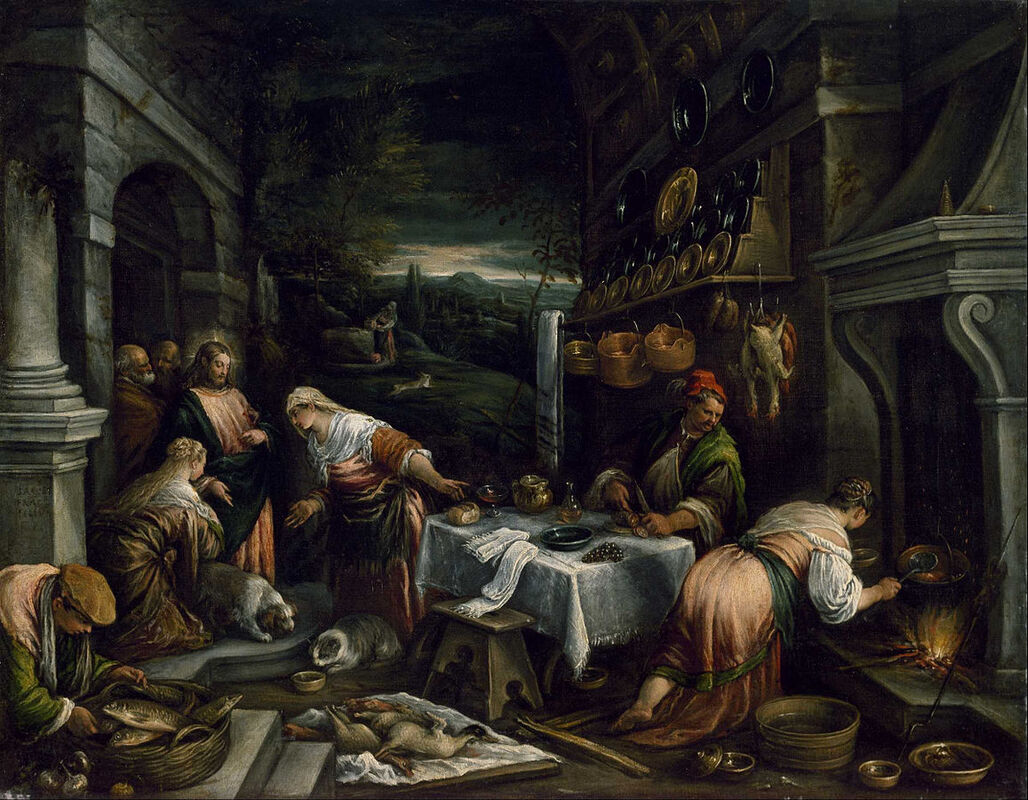|
by the Reverend Nancy Emmel Gunn Our Gospel today is a story of deep friendship and imminent loss. I love the Mary, Martha and Lazarus stories. It is clear from these passages that Jesus shared an intimate bond with this family. And in this one, Mary, the sister with her head in the clouds, offers Jesus a physical sign of her affection and a warning of things to come. Jesus is on his way to Jerusalem for what will be his final days. He makes a stop in Bethany, a Jerusalem suburb to visit his dear friends. Jesus joins Lazarus and his two sisters in a meal. Lazarus has recently been raised from the dead. I am not sure what kind of state he is in here after his resurrection, but I would guess he might have been kind of out of it, shaky and uncertain. And as is her way, Martha is in charge, cooking and fretting. Mary is silent, looking adoringly at their guest. Since in none of the passages about this family, are spouses or children mentioned, it is likely that all three siblings are single and live together, an arrangement that would not have been odd in the first century. As unmarried women, Mary and Martha would have been entirely financially dependent on their brother. They were grateful to Jesus, of course because they cared for their brother and overjoyed to have him brought back to life. But upon Lazarus’ death, they would have had no means of supporting themselves; their lives would have been upended. This is surely a fellowship table. The friends share a meal together, eating and talking. Recalling fond memories as friends do. This must have been a home where Jesus is truly comfortable. His sandals off, his arm draped over his chair, he is at ease. He does not have to be or do anything. Here he is a human friend. He relishes this peace before the storm that is coming. Then Mary does several really odd things. She pours the nard, the entire bottle, over Jesus’ bare feet. Then she takes down her hair. And she uses her long hair to distribute the perfume across Jesus’ feet, the strands caressing the cracks and crevices and toes. She does not say anything. And as we have seen before, Mary is marching to a different drummer. She leaves the table and procures a bottle of fine perfume, spikenard or nard. Commentators have described it as having a strong earthy, musky scent. We can imagine the scene at the table. Her brother, still getting used to living and breathing again, does not speak. And Martha, well we all know someone like her, Martha was quietly appalled and she smiles thinly.  Jacopo Bassano, Public domain, via Wikimedia Commons That Mary would take down her hair would have been improper for a Jewish woman. And a single woman using her hair to paint expensive perfume on the feet of a single man would have been unheard of. But Mary is unusual. She lives by her heart. The first to speak is Judas. He complains “Why was this perfume not sold for three hundred denarii and the money given to the poor?” This question breaks the silence. And what Judas says does make some sense. A denarii is the sum that a laborer would have earned in a single day. Three hundred denarii would represent what such a worker would earn in nearly a year. In our today’s dollars, if a laborer earned our Missouri minimum wage of $11.15 per hour, that worker would earn $89.20 per day or $26,760 in 300 days. So the value of the perfume Mary poured out on Jesus’ feet is really substantial. The Gospel writer tips us off about Judas. “He said this not because he cared about the poor; but because he was a thief; he kept the common purse and used to steal what was put in it.” We know that Judas will betray Jesus, so this is more information about his unsavory and treacherous character. Jesus sets Judas straight: “Leave her alone. She bought it so that she might keep it for the day of my burial.” In these words, we realize that Mary understood Jesus’ impending death. Mary is the only one of Jesus’ followers who appear to comprehend that the Pharisees and others will get their way. Jesus’ end is imminent. We can guess that Mary had likely spent every penny she had to prepare this ointment for Jesus’ body at his death. This is probably the last time she will see her friend. And now with his execution only days away, she pours the entire bottle at his feet. The house is filled with the fragrance of the perfume. And once again, Jesus prophesizes his own end: “ You always have the poor with you, but you do not always have me.” This meal with his friends in Bethany is a nod to Jesus’ final meal with his disciples. There he will do another odd thing: he will act as servant and wash the feet of his friends. Mary’s act is today is excessive, unreasonable. The poem "Alabaster Jar" by Myra Nagel captures this. Priceless jar Priceless life Perhaps Mary is a prophet. Heeding the signs, and a little off by the standards of the day. Mary knows that Jesus is indeed the Messiah, the anointed one. This is her act of worship and friendship. She anoints her friend as if in death. This warm but bizarre action is also an omen for Christ’s crucifixion where his feet will be nailed to a cross. But for this day, Jesus is safe, enjoying the last hours of his humanity. Enjoying Mary’s extraordinary gift. And in these hours, such beauty is enough. Amen The Reverend Nancy Emmel Gunn is Priest-in-Charge at St. John's.
0 Comments
Leave a Reply. |
Editorial contactVarious members of the St. John's congregation contribute to this blog. For editorial suggestions, contact Jeff McIntire-Strasburg at [email protected] Archives
May 2024
CategoriesAll Bishop Deon Johnson Book Group Congregation Members Deacons Diocese Of Missouri Episcopal Church Features General Information Parish Events Podcast Presiding-bishop-michael-curry Sermons Terms-of-transition Vestry |
 RSS Feed
RSS Feed

